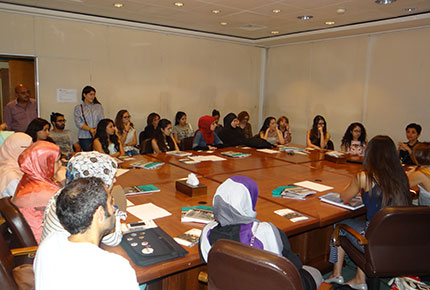What is gender and who cares about it, asks IWSAW
Inaugural monthly Women’s Institute series draws over 100 participants.
This week saw the launch of a new monthly series of discussions aimed at promoting awareness of and engagement with gender issues among the LAU community. The series, named “Food for Thought,” got off to a strong start on Tuesday as 40 students, faculty and staff gathered at the Beirut campus to learn more about gender dynamics through the presentation and exchange of ideas. A similar session held the following day at the Byblos campus drew over 70 participants.
“This is a space for discussion, to ping pong ideas back and forth,” said Lina Abirafeh, the newly appointed director of LAU’s Institute for Women’s Studies in the Arab World (IWSAW) and instigator of the monthly meetings. She began the informal 90-minute sessions with an introduction to gender equality, drawing on examples gained during her nearly 20 years in the field.
Abirafeh’s engaging narrative was complemented by a slideshow of many of the 1,300 photographs she had shot while on assignment in post-conflict and post-disaster zones, including Afghanistan, Haiti and Papua New Guinea. “I began to see the world through a gendered lens as a teenager and knew that this would be something I would be involved with for the rest of my life,” said Abirafeh to an audience composed primarily of young female students.
The participation of men in the struggle for gender equality was among the many topics raised by the audience. “Why do we focus on teaching women how to avoid rape instead of teaching men that rape and misogyny are harmful to society?” was but one in a series of impassioned questions posed. In the spirit of informal engagement, Abirafeh shared her knowledge and experience and encouraged others to do the same.
“My parents seem liberal, sending me to an American university and granting me freedoms, but when my uncle told me to stop wasting my time and find myself a rich husband, they simply laughed. No one defended me,” said one student, sharing her frustrations. “I don’t understand how mothers continue to abuse their children, accepting and even promoting genital mutilation, honor killing and childhood marriage. It is so selfish,” said another, launching the session into a vibrant discussion about the varying roles of women as victims and perpetuators of gender inequality.
Highlighting the broad and all-encompassing nature of gender issues and the diversity of the students present, one senior studying architecture spoke about how she is incorporating gender into her final year project. Another took the opportunity to introduce a newly formed student club called “Intersectional Feminism.”
“We could stay here for hours I’m sure,” said Abirafeh towards the end of one of the sessions. “We’re here unpacking the issues and trying to understand them. That’s how change starts and these are the kinds of discussions people need to have in order to hear different perspectives and counter perspectives and be able to find a way forward that works for everybody,” she added, highlighting the value of healthy debate and inviting everyone to visit the Institute at their leisure and join the continuing discussion in the coming months.
More
Latest Stories
- Into the Psychology of Justice
- Alumnus Zak Kassas on Navigation, Spoofing and the Future of GPS
- Hearing Between the Lines
- LAU Hematology Conference 2025: Advancing Science Through Interdisciplinary Exchange
- Dr. Chaouki T. Abdallah Invested as LAU’s 10th President
- LAU Guides Its Students Through the Code of Conduct
- Innovative Procedure at LAU Medical Center–Rizk Hospital Signals Hope for a Patient With a Congenital Disease
- LAU’s Inaugural PodChat Session Addresses AI Detection in the Classroom


